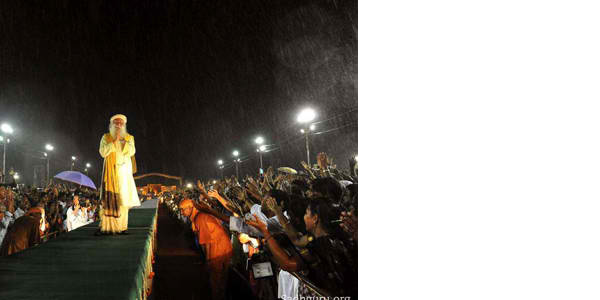Why Are Traditions Important?

“Tradition is valuable only as a means for the present generation of people to experience the same glorious thing that was the origin of the tradition.”
—Sadhguru
Sadhguru: There are many traditions in the world. But if you can follow any tradition to its source, you will see it is only an outer manifestation or expression of an inner experience of one person or a group of people. When people try to organize and deliver that experience to more people, it becomes a system, and then becomes a tradition, and tradition sometimes turns into a religion, and sometimes into many other things.
All these things start with an inner experience before the process of either disorganized flow or organized conduct. If it is a disorganized flow, generally it gets referred to as a tradition because it is a loose organization. If it is a more organized expression, it becomes an organized religion. But essentially, if you go back, you will see all these things originated in an inner experience of an individual human being or a group of human beings.
How Time Distorts Tradition
Whoever experienced whatever – a hundred years ago or a thousand years ago or ten thousand years ago – we bow down to them for who they are. But still, whatever someone experienced is only an inspirational story for you. Unless you experience it, it is not real. That person’s experience and that person’s life can only be an inspiration, never really the way. The only way for every human being is that he or she has to experience it. Maybe the guidance offered could lead you in that direction, but in these many years before it reached you, it might have been distorted.
For example, if you see something today, and you went and told someone what you saw, in twenty-four hours, if it goes through twenty-five different people and comes back to you the next day, you would not even recognize the story. Whatever is passed on from generation to generation, human minds are given to enormous distortion. This is the nature of the human mind because most people have not done anything about their minds.
For most people, their mind is not functioning independent of memory. What type of memory you carry in your mind, accordingly, that kind of contamination happens in your mind with whatever is given to you. So, in this country, we established a tradition, a science of transmitting with as much purity as possible. This tradition was called Guru-Shishya Paramparya.
A Tradition of Oral Transmission
According to the tradition, anything that is an inner experience should never be written down, only transmitted orally. No one has any right to even change a syllable in it – it must be transmitted exactly the same way, with no interpretations. Nobody should write any commentaries about it. For thousands of years, we have managed this.
When someone experienced something, he delivered it to someone who held this above his life, not as a part of his life, or as his profession or hobby. This was more important than his own life. And this person transmitted it to the next generation. Even if he did not experience it, he delivered it in the same format to the next generation. This was a very wonderful system, but those times are gone and distortions have happened today unfortunately.
A Tradition is Not Important by Itself
Tradition is not important by itself. Tradition is valuable only as a means for the present generation of people to experience the same glorious thing that was the origin of the tradition. Unfortunately, we have come to a place where we think everything that happened a thousand years ago is better than what it is today. That is not so. Even a thousand years ago, there were people like you and me, there were struggles, there were problems, there was nonsense, there was everything.
It is just that people carry the memory of a few people’s glorious lives, and they think everyone at that time was like that. No, a few individuals were like that at that time. Even now, there are a few individuals like that. It is just that tradition has to come alive in individual experience. Only then that tradition becomes a living process. Otherwise, it just becomes an imposition, and one generation or the next will drop it.
Is Preserving Tradition Important?
All tradition will be demolished when it does not work. You cannot enforce something upon a generation if it is not working for them; it does not matter how sacred we think it is. So, the most important point is to travel back in your tradition, see what the source is, and see if you can bring that experience to the people who are sitting here. Then you do not have to tell them, “Please preserve the tradition.” They will anyway keep it alive.


